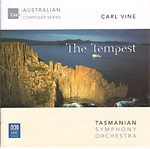Australian composer Carl Vine writes in a highly approachable idiom that incorporates tonality and melody, although his harmonic style is decidedly 20th century. The misty opening of the Oboe Concerto is where you’ll find Vine exploring the edges of atonality, but only briefly so. The piece as a whole brims with buoyant energy and features a rhythmically challenging solo part, which oboist Diana Doherty handles with confident virtuosity. Rhythm is a main feature in the Canzona, which begins slowly and builds to a vibrantly dancing end, and Smith’s Alchemy is a stirring string orchestra work that impresses through its brilliant textural variety and rhythmic energy.
Headlining this collection is the Suite from the Tempest, where Vine shows off his considerable prowess at musical characterization and orchestral scene painting, the effect of which is faithfully recreated by ABC Classics’ spacious and dynamically true recording. The music has a strongly cinematic quality, especially the Prospero Relents movement, where fans of John Williams will hear echoes of E.T.’s big tune. Ola Rudner leads wholly convincing performances of each work, while the Tasmanian Symphony musicians’ playing reflects their dedication to their compatriot’s music. If you’ve never heard any contemporary music from Australia, here’s a great place to start.
































